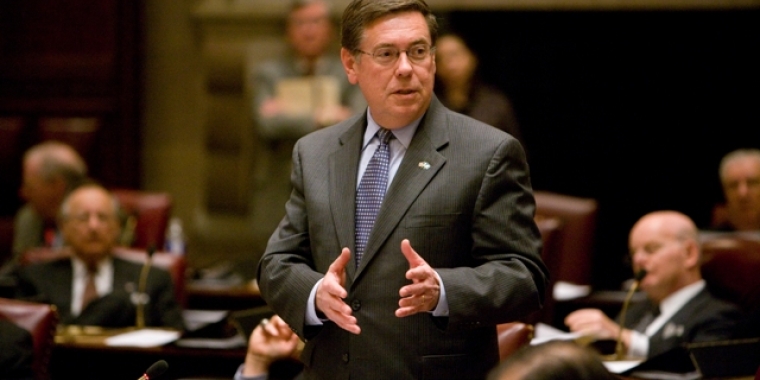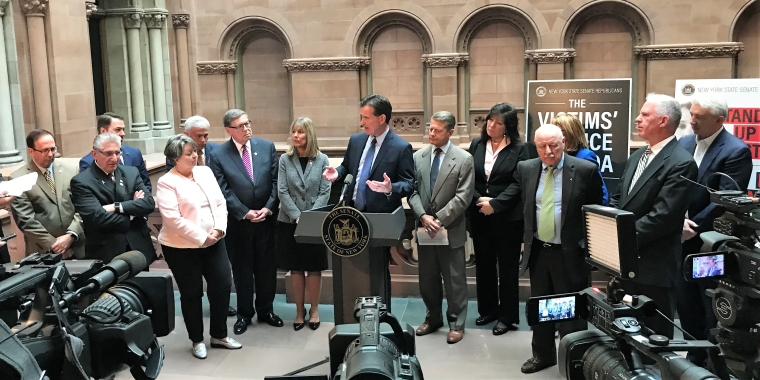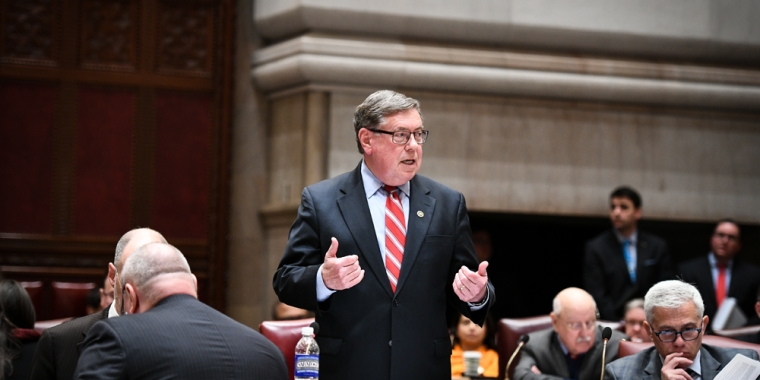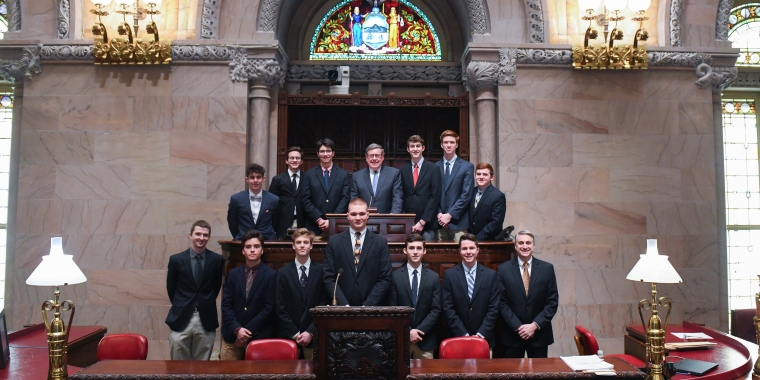
Seward Hails New Senate Leadership Coalition
James L. Seward
June 8, 2009

ALBANY, 06/08/09 -- Senator James L. Seward (R/C/I-Oneonta) is hailing a historic new bipartisan leadership coalition, elected today to bring reform to the state senate.
“Over the past five months the senate Democrats have failed to bring the change and reform they promised during last fall’s campaign,” said Senator Seward. “This new reform team is a major step forward for openness, transparency and reform, and it will empower individual senators and the public to take back their government from the political bosses.”
After being abandoned by their leadership, a number of Democrats approached the senate Republicans and have joined them in forming a reform caucus that has chosen new leadership in the senate.
Under new senate rules adopted today, more power is given to individual members; the committee process has been strengthened; greater debate and consideration of legislation will be allowed and resources among the members of both majority and minority parties will be equalized.
“These new rules will mean all residents across the state will truly be represented in Albany,” Seward continued. “Each senator will have the ability to bring constituent concerns to the floor, and at the end of the day the interests of all will be fairly represented.”
The Democratic New York City leadership in the senate and the assembly conducted secret negotiations that resulted in record increases in taxes and spending in the state budget. Members of the senate from both parties were excluded from participating in the process. More secret negotiations by the Democrat leadership in the senate and assembly followed as an MTA bailout plan that included even more tax hikes was put together behind closed doors, with no input from the public. On other important issues, the senate Democrat leadership has routinely stifled debate on the floor of the senate and made a mockery of the committee and legislative processes.
“This is a new day for the New York State Senate and I am excited to be a part of the unprecedented reform. Now we can truly get to work on bringing taxes down, creating jobs and reforming New York,” Seward concluded.
-30-
Attached is a list of new senate reform rules adopted today.
Summary of Rules Changes
Temporary President
• The Temporary President of the Senate presides in the absence of the Lieutenant Governor. He is subject to a term limit of 6 years.
• Appoints the Vice President of Urban Policy and Planning.
• Appoints officers and employees of the Senate, subject to the disapproval of the Vice President Pro Tempore and Majority Leader (VPPT). Appoints Vice Chair of Rules.
• Appoints the Legislative Librarian.
• Represents the Senate in any legal action.
• Ensures the use of electronic media to provide access to Senate documents and proceedings.
• Jointly, with the VPPT, appoints the chairs of all standing committees and commissions and the members of all committees and commissions.
• Jointly, with the VPPT, designates appointments to all boards, commissions, task forces, etc. to which the Temporary President has appointing authority.
Vice President Pro Tempore and Majority Leader
• If the TP does not preside, the VPPT is the presiding officer, or may designate another to serve for him. Also subject to a 6 year term limit.
• Chairs the Rules Committee, or may designate another as Chair.
• Appoints Senate Leadership positions, and jointly appoints the membership to committees.
• Coordinates Majority conference and all functions and operations of the Senate.
• Appoints officers and employees of the Senate, subject to the disapproval of the TP.
• Exercises general control over Senate property, in consultation with the TP.
• Designates persons with access to the floor, jointly with the TP.
Rules Reforms
• The Senate shall be administered in a fair, equitable and nonpartisan manner.
• Committee Chairs and Rankers are term-limited to 8 years.
• Committee membership will be proportional to membership in the Senate as a whole. Minority representation shall not be less than 33% on any committee. (Eff. 7/15/09).
• Proxy voting in committee is eliminated.
• Eliminates “aye without recommendation” members must either vote nay or aye on a bill, unless they abstain due to a pecuniary interest.
• All agendas and voting records will be published on the Senate Website; all committee meetings recorded and webcast. A plan will be put forward by January 1, 2010 to create NY-SPAN statewide broadcast of legislative proceedings similar to C-SPAN for Congress.
• No bill may be introduced without a named Senate sponsor.
Administrative Reforms
• All members will have access to the resources and services of the Senate: supplies, print and media production, administrative services, and mailing.
• District office allocations are based on the geographic area; larger districts will be allowed a satellite office(s) to meet the needs of their constituents.
• All members will receive the same base allocation for staffing.
• Committees and Leadership will receive an allocation for staffing pursuant to a resolution which will detail the amounts allocated for each committee or position. Amounts shall be proportional among majority and minority members to representation in the Senate as a whole, but in no event shall it be less than 33% for the Minority.
• Central Staff funding shall be allocated on a proportional basis, but in no event less than 33% of the funds shall be allocated to the minority. Staff necessary to the functions of the Senate are not to be included in the proportional distribution.
• Member items will be divided evenly.
Procedural Reforms
• A non-sponsor amendment if successful will retain its place on the calendar for three days and then shall be taken up by the body for final passage, not returned to committee.
• Messages of Necessity shall only be permitted in cases of actual emergencies.
• A new motion for consideration is created. A sponsor may move to have his or her bill included on the next active list if a majority of members present and voting agree to the motion.
• A petition for consideration is also created, which allows a majority of the members elected to request a bill be put to the floor. If successful, the bill shall be placed on the active list for the next session day. If within the last four days of session, it shall be immediately considered by the body if successful.
• All procedural votes require only a majority of members present and voting, rather than members elected.
• Debate may exceed 4 hours on budget bills, any bill considered pursuant to a message of necessity, or those which appropriate money.
Share this Article or Press Release
Newsroom
Go to NewsroomSeward, Senate Republicans Unveil Victims' Justice Agenda
April 30, 2019

State Budget Fails New Yorkers
March 31, 2019


